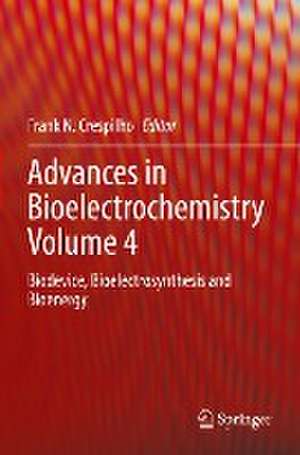Advances in Bioelectrochemistry Volume 4: Biodevice, Bioelectrosynthesis and Bioenergy
Editat de Frank N. Crespilhoen Limba Engleză Paperback – 6 mai 2023
| Toate formatele și edițiile | Preț | Express |
|---|---|---|
| Paperback (1) | 992.19 lei 43-57 zile | |
| Springer International Publishing – 6 mai 2023 | 992.19 lei 43-57 zile | |
| Hardback (1) | 998.03 lei 43-57 zile | |
| Springer International Publishing – 5 mai 2022 | 998.03 lei 43-57 zile |
Preț: 992.19 lei
Preț vechi: 1209.98 lei
-18% Nou
Puncte Express: 1488
Preț estimativ în valută:
189.92€ • 206.36$ • 159.63£
189.92€ • 206.36$ • 159.63£
Carte tipărită la comandă
Livrare economică 21 aprilie-05 mai
Preluare comenzi: 021 569.72.76
Specificații
ISBN-13: 9783030996642
ISBN-10: 3030996646
Ilustrații: V, 145 p. 50 illus., 45 illus. in color.
Dimensiuni: 155 x 235 mm
Greutate: 0.22 kg
Ediția:1st ed. 2022
Editura: Springer International Publishing
Colecția Springer
Locul publicării:Cham, Switzerland
ISBN-10: 3030996646
Ilustrații: V, 145 p. 50 illus., 45 illus. in color.
Dimensiuni: 155 x 235 mm
Greutate: 0.22 kg
Ediția:1st ed. 2022
Editura: Springer International Publishing
Colecția Springer
Locul publicării:Cham, Switzerland
Cuprins
1. Protein Engineering for Designing Efficient Bioelectrodes.- 2. Bioelectrosynthesis of Value-Added Compounds Production.- 3. Progress in Enzyme-Based Biofuel Cells.- 4. Bioinspired Batteries: Using Nature-Inspired Materials In Greener And Safer Energy Storage Technologies.- 5. Biophotovoltaic: Fundamentals and Applications.
Notă biografică
Frank Crespilho is Professor of Physical-Chemistry at Chemistry Institute of University of Sao Paulo, São Carlos, since 2012. He was Associate Professor of Chemistry at Federal University (UFABC), Brazil (2009-2012), Visiting Associate in Chemistry at California Institute of Technology, Caltech (EUA), and Visiting Professor at Max-Planck-Institute for Solid State Research, Stuttgart, Germany (2016). He was Visiting Professor at Harvard University (2018-2019) at the laboratory of Prof. Michael Aziz and since 2019 he is Fellow of the J. A. P. School of Engineering and Applied Sciences, Harvard University. He is Coordinator of COVID-19 Network in metabolomics and diagnostics chemistry at the University of São Paulo. He was one of the inventors of the "Popular Fast Test of COVID-19," costing less than a dollar, for mass testing in developing countries. His research interests include fundamental and applied bioelectrochemistry with a distinctive focus on the chemistry of energy, life andhealth. His work combines physical chemical methods and instrumentation development timely application to biological fuel cells and bioinspired batteries, biosensors technology and electron transfer reactions in biological system. His recent work focuses on in situ and operando spectroscopic-electrochemistry elucidation of the electron transfer mechanism involving redox enzyme, proteins, DNA and drug delivery in single cells. He has made contributions on the field of protein immobilization processes on solid surfaces, single cells micro-FTIR analysis, bio-electrocatalysis and coupling analytical tools to resolve electron transfer mechanism in proteins. He developed a technique named electrochemical coupled vibrational spectromicroscopy (EVSM), which consist in a multiplex infrared spectroscopy imaging system for monitoring spatially resolved redox chemistry in bioelectrodes, bioinorganic molecules, biological films and single cells.
Textul de pe ultima copertă
This book presents a collection of chapters on modern bioelectrochemistry focusing on new materials for biodevice, bioelectrosynthesis and bioenergy. The chapters cover protein engineering, semiconductors, biorecognition, graphene-based bioelectronics, bioelectrosynthesis, biofuel cells, bioinspired batteries and biophotovoltaics.
Caracteristici
A collection of chapters on modern bioelectrochemistry Focus on new materials for biodevice, bioelectrosynthesis and bioenergy Covers protein engineering, graphene-based bioelectronics and biofuel cells
